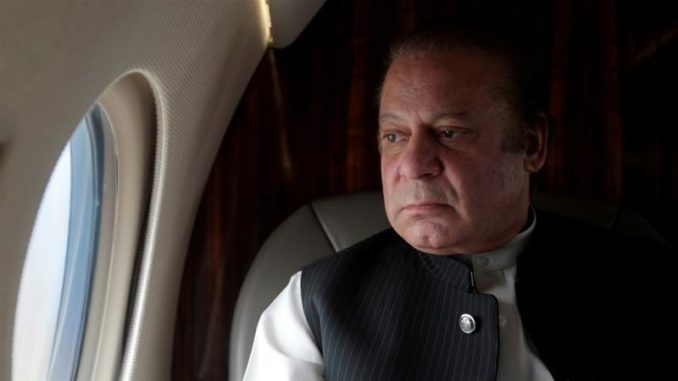
Islamabad, Pakistan – Pakistan’s Supreme Court has ruled to disqualify Prime Minister Nawaz Sharif from his position as leader of the country’s government.
Friday’s landmark ruling comes after months of hearings in a case instigated by the “Panama Papers” leaks, related to alleged corruption during his previous two terms in office.
A five-member bench of the Supreme Court announced the verdict to a packed courtroom in the Pakistani capital, Islamabad.
Sharif’s ouster means that his ruling Pakistan Muslim League-Nawaz (PML-N) party, which holds a comfortable majority in parliament, will have to nominate a new leader of the government in his absence.
The government could also call snap polls, although a general election is due by early August next year.
The 67-year-old becomes the latest Pakistani prime minister not to have completed a five-year term in office, many having been ousted in coups by the country’s powerful military, which has ruled the country for roughly half of its 69-year-history.
Sharif and three of his children have been referred to a National Accountability court, which has been ordered to register a corruption cases against them within six weeks, the judges said.
‘True accountability’
Security was tight outside the Supreme Court on Friday, with scores of riot police and paramilitary personnel deployed to secure the building.
Speaking ahead of the verdict, Siraj-ul-Haq, the leader of the opposition Jamaat-e-Islami party and one of the plaintiffs in the case, said he hoped the decision would help strengthen rule of law in the country.
“From the start, I have been supporting the view that … true accountability is necessary for true democracy,” he told reporters outside the courtroom. “The law seems to not have been applied to the rich, but only to the poor.”
The case against Sharif has also been championed by cricketer-turned-politician Imran Khan’s Pakistan Tehreek-e-Insaf (PTI) party.
“After today’s verdict, the responsibility for which direction we take lies with the parliament … we believe that at this delicate moment, all patriotic Pakistani political parties need to unite,” said Naeem-ul-Haque, a spokesman for Khan.
Sharif’s supporters, meanwhile, had been defiant ahead of the announcement.
“The PML-N will fight every crisis, attack and conspiracy with wisdom, courage, integrity and honour,” said Khawaja Saad Rafique, the federal railways minister.
Money trail
The allegations against Sharif have centred around the ownership of four apartments in London’s posh Park Lane neighbourhood.
In 2016, the International Consortium of Investigative Journalists leaked 11.5 million documents from Panama-based law firm Mossack Fonseca, dubbed the ‘Panama Papers’.
Included in the leak were several documents that showed that three of Sharif’s children – Hussain, Hasan and Maryam – owned at least three off-shore companies registered in the British Virgin Islands.
The documents showed that these companies had engaged in deals worth $25m.
Crucially, one of the documents also showed that the companies had been involved in the $13.2m mortgage involving the London properties as collateral, the first time that the Sharif family’s ownership of the apartments had been proven on paper.
In November, after months of political turmoil, the Supreme Court began hearings in a case seeking to establish whether the Sharif family had committed any wrongdoing in obtaining the properties or if the prime minister was liable for not declaring them earlier on tax and parliamentary wealth declarations.
Sharif denies any wrongdoing, saying the assets are legally held by his children and are not in his name, and that therefore he is not liable to declare them or be taxed on them.
The court demanded that the Sharif family establish a clear money trail showing how they came to own the properties.
According to the Sharifs, the money was obtained from the sale of a steel mill in the United Arab Emirates, and was further invested with Hamad bin Jassim bin Jaber al Thani, a Qatari royal and former prime minister of that country.
Not satisfied with the explanation, the court in April constituted a high-level team to investigate the Sharifs contentions.
That team, which included members of the military’s intelligence agencies, presented a damning report to the court on July 10, declaring: “Failure on the part of all respondents to produce the requisite information confirming ‘known sources of income’ is prima facie tantamount to not being able to justify assets and the means of income.”
No democratically elected prime minister in Pakistan’s history has completed a full five-year term.
Sharif’s first two stints in power in the 1990s were both cut short, including by a military coup by General Pervez Musharraf in 1999.
Other prime ministers have been ousted in two previous coups in 1958 and 1977, by the courts or by motions of no-confidence within the parliament.
